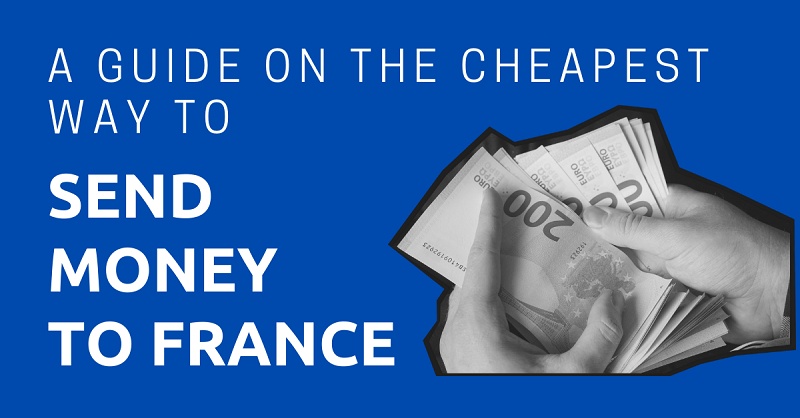
Whenever you send money to France, you want to be sure you’re getting the best exchange rates and paying the lowest transfer fees so you get the most EUR in your French back account.
But with all the brick and mortar and online money transfer service options available, which service should you go with?
That depends on quite a few things, such as the type of transfer fee, whether or not the service is taking a percentage of the exchange rate, and more, which this guide will cover in detail.
Before you find out the best way to send money to France, however, check out Monito, a website that lists the cheapest online money transfers services on any given day.
This article will take approximately 14 minutes to read. Don't have the time right now? No worries. You can email the ad-free version of the article to yourself and read it later!
Disclaimer: This article may include links to products or services offered by ExpatDen’s partners, which give us commissions when you click on them. Although this may influence how they appear in the text, we only recommend solutions that we would use in your situation. Read more in our Advertising Disclosure.
Contents
What to Watch Out for When Sending Money to France
Before you make an international money transfer into France, there are four important things you must take into consideration – transfer fees, exchange rates, transfer speeds, and transfer security.
Let’s look at each one in detail.
Transfer Fees
When sending money to France, you’ll more than likely have to pay one of three types of fees that are listed below.
- fixed fee
- percentage fee
- combination fee
Fixed Fees
A fixed fee is the first transfer fee you’ll encounter when sending money to France. Fixed fees are constant regardless of the quantity of money you send but vary between banks and online money transfer service providers.
Citibank, for example, charges USD17.50 regardless of the amount sent to France, making bank transfers one of the most affordable solutions for sending tens of thousands of dollars into the country.
Percentage Fees
A percentage fee is another transfer fee you may encounter. However, unlike fixed fees, percentage fees vary according to the amount you send to France.
Wise, for example, charges 0.48 percent on a USD1,000 transfer, which corresponds to around USD4.80.
Bear in mind, however, that transferring money into France using an online money transfer service and credit card will incur more percentage fees of between 1 percent and 3 percent of the total amount you send.
Combination Fees
When sending money to France, the third fee you’ll encounter is the combination fee, which is a mix of a set fee fee and a percentage fee.
PayPal charges for international money transactions using this format.
Bear in mind that pricing structures may not necessarily indicate whether a service will be more affordable or more expensive than another.
Exchange rates also play a significant influence in transferring funds to a bank in France, so let’s take a look into how they may save you some money, or maybe cost you more money.
Exchange Rates
Banks and online money transfer service providers rarely provide mid-market rates (except for some companies like Wise), so compare the exchange rate you’re provided with the mid-market rate on XE.
Furthermore, service providers who do not charge transfer fees, such as Xendpay for the first USD2,773, make money by taking a tiny share of the exchange rate.
On average, Xendpay takes around 2 percent to 3 percent of the mid-market exchange rate that you will see on XE.
Apart from transfer costs and currency exchange rates, you must also look into transfer speeds.
Transfer Speeds
The transmission of funds to France through online money transfer provider like Xendpay, Wise, or Western Union may take minutes, hours, or days.
Also, transfers from one bank to another will take between one to three business days.
If you want to use a bank to transfer money to France, it would be prudent to transfer before the banks cutoff time. The international payment cutoff in America, for instance, is between 4 pm and 5 pm EST, depending on your bank.
Transfer Security
All of the international money transfer service options below are both safe and secure. Here are just some of the security features they use:
- data encryption
- anti-money laundering monitoring
- internet security protocols
- fraud prevention, advanced real-time warnings
- fraud monitoring
That said, let’s jump into your money transfer choices.
Money Transfer Service Options
When it comes to sending money from overseas into your French bank account, you have quite a few options.
Let’s look at each one, from online service providers to brick and mortar banks, starting from the cheapest to most expensive.
Xendpay
Xendpay have a great offer for people sending for the first time, as they offer a “pay what you want” model for the first USD2,275 you send to France.

And while Xendpay doesn’t give you the same mid-market rates as Wise (it generally takes 2 percent to 3 percent of the exchange rate), you shouldn’t entirely disregard them.
A USD1,000 transfer into your bank account in France using Xendpay you would get EUR841.32.
The amount of EUR you get is more than Wise, but keep in mind once you hit your free transfer limit of USD2,275, Xendpay will start charging you a transfer fee of 2 percent to 3 percent of your transfer amount.
Overall, you also have to pay a fee if you forgo a bank transfer and use your credit or debit card. In both instances, you’ll pay a 2.3 percent fee to use either of these cards.
When you transfer money to France with Xendpay, you’ll get your funds within one to three business days.
You can transfer through Xendpay using its website or app for Android and iOS.
Wise
Wise and their mid-market exchange rates make them popular with expats in France, so let’s see how much it costs to send USD1,000 to your French bank account using the service.

First, Wise will charge you a fixed fee of USD6.17 plus a percentage fee of 0.43 percent for transfers up to USD139,005, meaning you’ll pay a total of USD7.39 in fees for a USD1,000 transfer and get EUR836.42 on the receiving end.
As your transfer amount increases, the percentage fee decreases, dropping all the way down to 0.26 percent – but this is for transfers well over USD1 million.
Second, the amount you pay in fees also depends on the payment method you choose. Here are the fees below:
- wire transfer — USD5.64 fee
- debit card — USD11.27 fee
- credit card — USD37.44 fee
Moreover, Wise promises that you’ll receive your funds within hours, unless you transfer after banking hours or on weekends.
You can use Wise on your smartphone or computer, regardless of whether you have an Android or iOS app.
Check out our in-depth review of Wise.
PayPal (Xoom)
After Xendpay and Wise, you’re next cheapest option when sending money to France in PayPal’s Xoom.

For a USD1,000 transfer to France you would receive EUR826, just slightly better than Western Union.
Zoom doesn’t charge a fee when using a bank to transfer your money, but they do take anywhere from 2 percent and 4 percent from the mid-market currency rates on XE.
If you opt to use your credit or debit card, Xoom will charge USD30.49 in both instances, not including the fees that your credit card company would charge.
PayPal’s Xoom does offer one advantage – transfer speed. You could receive your money in France in less than three hours.
Additionally, its website is simple to navigate and integrates with your PayPal account, and it also has an Android and iOS app.
Western Union
While Western Union isn’t as cheap as Xendpay or Wise when transferring money into France, it is cheaper than banks and offers speedy transfers.

Moreover, Western Union does offer free bank transfers, but it does deduct around 4 percent to 5 percent from the mid-market exchange rate, which is why the receiving amount in EUR is so much lower than Xendpay and Wise.
With that, if you send USD1,000 to France by Western Union via a bank transfer, you will get a maximum of EUR818.70, and it should arrive within zero to four working days.
You may use other transfer options that are quicker (one working day), but the fees would increase to:
- credit card – USD29.99 fee
- debit card – USD2.99 fee
Now, let’s take a look at the brick-and-mortar options.
Bank Transfers
Avoid banks for transactions for amounts of up to USD10,000 and instead use Wise or Xendpay, as it will save you money.
However, for larger transactions, banks are often the best option because the majority of them charge fixed fees instead of percentage fees.
This is why banks are the preferred means of large money transfers for expats in France who want buy a car, a house, or maybe start a business.
The cheapest bank in the U.S. for international money transfers is Citibank. They charge a fixed fee of USD17.50 on all transfer amounts.
Barclay’s in the U.K., on the other hand, charges only GBP15 for international money transfers done online.
These two banks – and most others – don’t usually publish exchange rate fees, so you’ll have to ask them directly. Having said that, it’s reasonable to assume they charge between 2 percent and 4 percent in exchange rates fees.
Also, if you send you money from your bank in the U.S. or U.K., it will arrive in your French account within one or two business days. But try to send the money from Monday to Wednesday, that way you won’t be held up by the weekends.
The main disadvantage of using a bank is that the process is significantly more time consuming if you don’t have an online account.
ATM Withdrawals
Expats won’t have to pay withdrawal fees to French banks for using their ATMs, but privately held ATMs like Retrait and others do demand exorbitant fees and should be avoided.
You’ll notice these machines by their lack of identifiable bank branding.
French banks also calculate EUR withdrawals by the mid-market rate – amazingly – ensuring that you receive a fair amount of cash.
However, your home bank will levy a variety of fees on your transactions, so keep this in mind.
You should anticipate being charged at the very least a withdrawal fee and a foreign currency transaction fee depending on your bank, your account type, and the terms and conditions of your credit or debit card.
Using a debit card, for example, Canadian banks would charge you a bank withdrawal fee + foreign exchange fee, or in other words, a CAD4.06 fee for using your card and on top of that a 2.5 percent exchange rate fee.
So, if you withdraw CAD800 from an ATM in France, it would be like receiving CAD780.00 (EUR527.34).
Withdrawing money with a credit card is more expensive than withdrawing money with a debit card.
Withdrawals from credit cards are treated as cash advances, or loans, by the credit card providers. So I would suggest only using your credit card in an emergency.
Cryptocurrencies
France does have none Bitcoin machines, so if you want to withdrawal your digital assets for cash, you can do so in Lyon, Marseilles, or Paris.
Each of these three places have Bitcoin machines at the time of publishing this article.
However, and especially in Paris, the Bitcoin machine owners could charge fees of up to 50 percent of the usual Bitcoin machine fees.
The Best Method to Send Money To France
Now that we know which international money transfer service options you have, let’s look at a table of all the amounts you’d get when transferring either USD1,000 or USD10,000 into France from abroad.
| Method | Speed | USD1,000 | USD10,000 |
| Xendpay | 1 to 3 days | EUR841.32 | EUR8,413.20 |
| Wise | 1 to 3 days | EUR836.42 | EUR8,368.22 |
| PayPal | 1 day | EUR826.00 | EUR8,266.00 |
| Western Union | 1 to 4 days | EUR818.70 | EUR8,187.00 |
| Bank Transfers | 1 to 2 days | EUR805.65 | EUR8,185.65 |
Xendpay is the cheapest way to send money to France, yielding the most EUR on the receiving end. In last place is bank transfers, which would get you the least amount of EUR into your French bank account.
Now let’s look at the cheapest choices from specific countries.
Country-Specific Recommendations
If you’re an expat in France originally from the U.S., the U.K., or Canada, here are your cheapest choices for transferring money to France.
United States
When going the online route, Xendpay is your cheapest choice. It will give you the most EUR in your French account whether you’re sending USD1,000 or USD10,000.
However, if you need anything more than that – say, up in the tens of thousands of Euros – then go with a transfer from a bank like Citibank, which has the lowest fixed fees on international transfers in all of the U.S.
United Kingdom
If you have a bank account in the U.K., your cheapest bet is to sing up for a Xendpay account, link it to your U.K. bank, and transfer money that way.
For a GBP1,000 transfer, you’d get EUR1,168.69 on the receiving end, and you’d be able to take advantage of Xendpay’s no-fee transfers of up to GBP2,000.
When you have to transfer over GBP10,000, Barclay’s bank is your next best choice, as they only charge GBP15 for international money transfers.
Canada
Xendpay is also a great choice for Canadian expats in the France.
A CAD1,000 transfer through Xendpay would yield EUR674, just slightly over Wise’s amount of EUR670.16.
As for bank transfers, Scotiabank would be your cheapest choice, as it only charges CAD19 for international money transfers to France.
Now, on to You
That wraps us this guide on how to send money to France. Now that you know which options are available, you can decide which service to go with depending on how much you want to send and from where.
But remember, always check with Monito before making a transfer, as their top money service providers may be able to get you more EUR in your French bank account.







